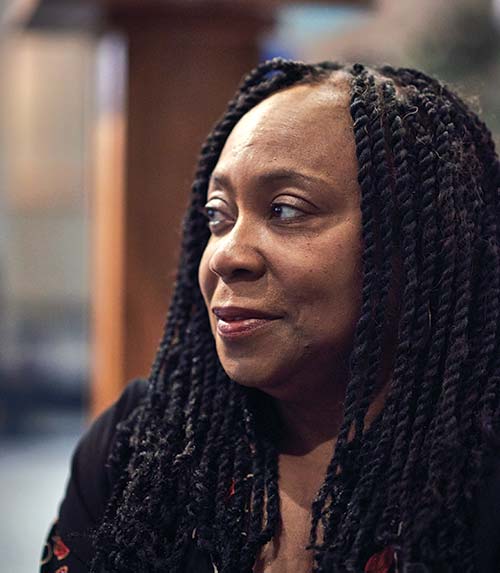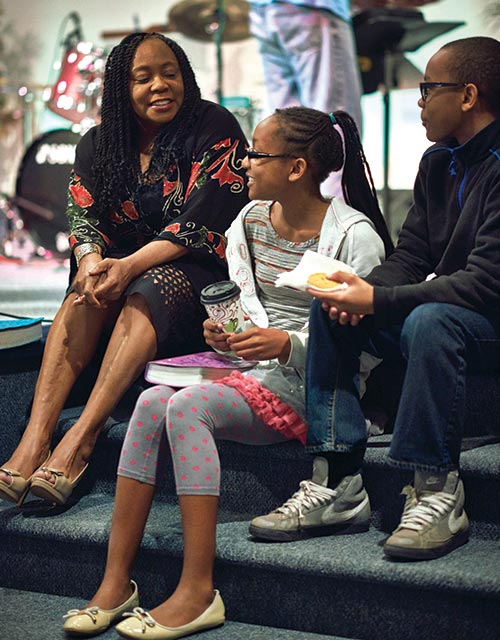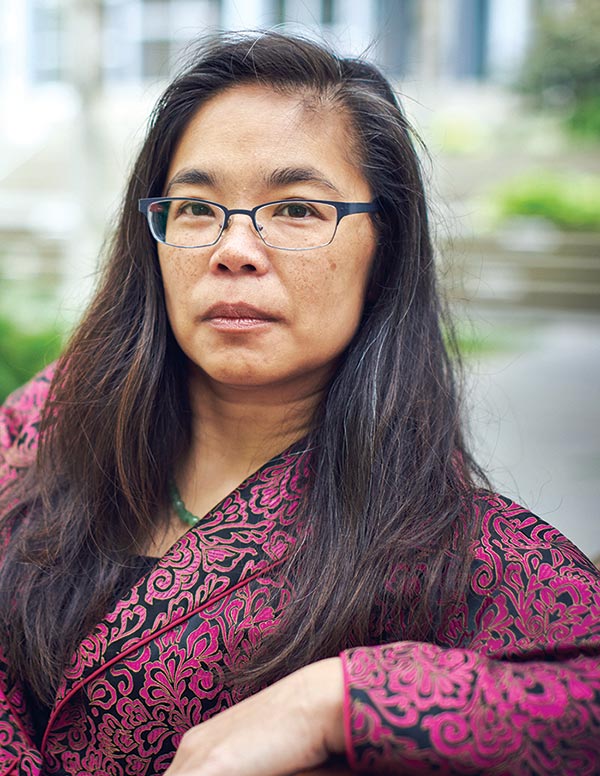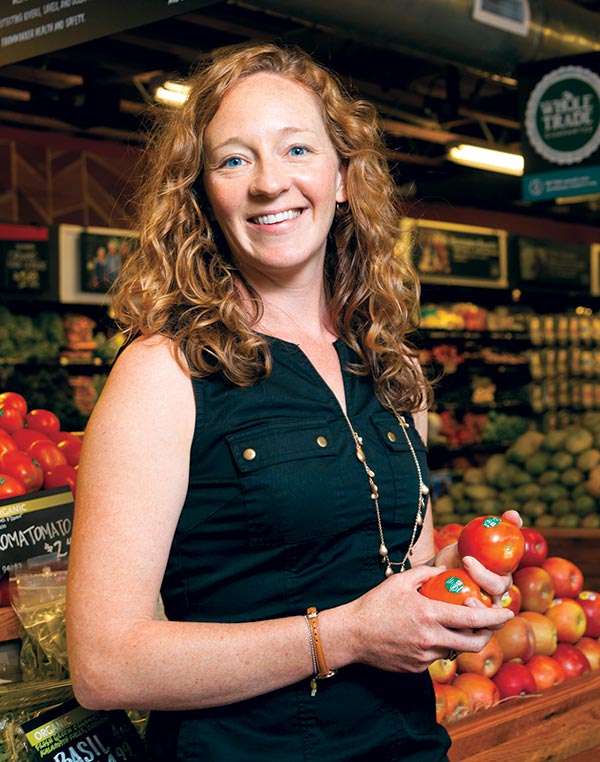Meet a few of the SPU alumni who have dedicated their careers to working against human trafficking.

“I miss the girls,” says Sheila Houston ’02, founder of Rare Coins Ministry. “But I also realize there has to be a deeper work and the church has to be a voice in this work, because that’s where true transformation comes from.”
Sheila Houston’s advice for how to support youth at risk for commercial sexual exploitation.
“If you’re someone who doesn’t have a lot of time, find ways to get some of the information already out there and start talking about it,” Houston says. For instance, the Washington Anti-Trafficking Response Network provides a list of tips for identifying and assisting victims of trafficking.
Houston has used the Deceptions program, developed in Oregon by law enforcement. Aimed at junior and senior high youth, the program can be used to help youth recognize and avoid predators and potential traffickers.
“Some of the most vulnerable youth I’ve met are coming out of the church,” warns Houston. She says the church often doesn’t do enough to promote good relationships and warn against dangerous ones. One young woman she met on the streets had attended Christian schools and then entered a Christian university, intending to become a praise and worship leader. “I asked her, ‘How did you get here?’ Well, she started dating someone with a kid, and he didn’t have enough money.”
“It’s really a societal problem,” says Houston, an ordained Free Methodist minister. “But we have to look at this ministry, or work, outside of a secular viewpoint. It’s a God movement, and we need to hear the voice of the Lord about how to move in this time and season to do this work.”
Born and raised in Seattle, Sheila Houston has spent three decades turning her personal tragedy of working in what she calls “the life” into a story of redemption and reconciliation — for herself and for more than 2,500 young women.
Pregnant and married by 16, Houston found herself coerced by an abusive husband to work as a prostitute to support the family in the mid-1970s. And, although she was able to escape her husband, she remained in “the life” for several more years.
“Deep down inside, I knew that this wasn’t right,” she says, adding that other women in sex work were nonetheless her community of friends.
Then in 1985 Houston had her own “road to Damascus” experience.
One Sunday morning, while walking home from her sister’s house, “Just like for Paul, a light shone out of heaven,” she recalls. “It pointed at this church.” She knew God was calling her to go to church. That church. Now.
She ran home, borrowed a slip from a friend “to make myself a little churchy,” and went back. “That was 30 years ago,” says Houston, “and from the day I met Jesus, I’ve never been the same.” A mere two weeks later, she was asked to teach the children’s ministries, and Houston dove into the Bible as she prepared to teach the kids. “My redemption and my change really came from the word of God and my willingness to allow the word to change me.”
Ten years later, Houston earned a GED — 23 years after dropping out of high school. Three years after that, she earned an associate’s degree from South Seattle Community College; she also met Darlene DuBose ’94, a former SPU staff member. “She began to talk to me about SPU, and I knew in that moment that I was going,” says Houston.
When Houston matriculated at Seattle Pacific in 1999, she was not a typical student. The average age of incoming students was 19; she was an “adult learner” on a mission. The student body was more than 90 percent white; Houston was African American. Yet Houston quickly showed her leadership chops.
She studied organizational behavior, the foundation for what are now MA and PhD and industrial-organizational psychology programs, says Rob McKenna ’90, associate professor of industrial-organizational psychology. “I always appreciated her conviction as a leader in the classroom and in the community.”
And Houston didn’t stop with a bachelor’s degree, following it with an executive master’s in not-for-profit leadership from Seattle University and a certificate of pastoral leadership. She’s currently earning a doctorate in ministry there, which she expects to complete in 2017. In 2005, Houston went back to the streets — this time leading teams to care for sex workers in downtown Seattle. As director of New Horizons Ministries’ Late Night Outreach program, Houston and two or more female volunteers would stand on the corner at Sixth and Thomas. Pimps stood on the other corners; female sex workers meandered up and down the street. Says former volunteer Hannah Bryant: “We spent time with the women on the prostitution track, handing out hot chocolate and condoms. They called us the ho-helpers.” Rain or shine, the teams were there.
 As a minister at Living Hope Christian Fellowship in Renton, Washington, Houston invests in the lives of young people at her church.
As a minister at Living Hope Christian Fellowship in Renton, Washington, Houston invests in the lives of young people at her church.
“The goal was not for us to rescue anybody, but to be a presence in the lives of the women and girls,” Houston explains. “And as we listened, we began to ask them about their dreams when they were young. You try to find ways to help them find themselves again.” They also told the women that if they ever had to go to court, they’d go with them.
One woman, Houston remembers, was asked to determine how much money she’d made for her pimp. “She didn’t realize she’d made this guy all this money,” says Houston. “That really disturbed her.”
Not long into Houston’s tenure with the late-night program, she made a 2 a.m. call to Rita Nussli, then New Horizons’ executive director. They needed to help the pimps, too, she told Nussli. They were someone’s sons, and Jesus wouldn’t ignore them. Over the next weeks, says Nussli, “She steadily moved toward the completion of this vision until she had a strong team of men” who’d minister to the pimps.
Houston didn’t limit her work to the late-night outreach, though. She also worked with the city and state government to address sex trafficking, even being named on a city resolution to increase penalties for the patrons.
She remains on the Statewide Coordinating Committee on Sex Trafficking, which is helping to improve services for trafficking survivors, championing survivors’ voices in statewide policy discussions, and aiming to reduce demand for sex trafficking.
By 2012, New Horizons Ministries had phased out its Late Night Outreach programs. With the city’s crackdown on prostitution, sex trafficking left the streets and went underground, now advertising via Internet and using hotels and personal residences.
Yet Houston has remained one of the region’s leading voices in the anti-sex- trafficking movement. And, like her husband of 24 years, George Houston, she is ordained in the Free Methodist church, serving as associate pastor of Living Hope Christian Fellowship in Renton, Washington.
In 2012, she also founded Rare Coins Ministries to educate and inform the public, churches, and schools about sex trafficking. Today, she is a consultant and popular speaker at educational seminars and conferences.
“As I began to talk to God about it, I realized the season for being on the streets for me is over,” she says. “Rare Coins is really to teach people how to do this ministry — not just looking at it from your own lens, but looking at it from the lens of those involved in the lifestyle.”
Ye-Ting Woo’s advice for joining anti-trafficking work in your state.
“Most victims do not identify themselves as trafficking victims,” Woo says. “The movies you see that are sensationalized — it’s not that those things don’t happen, but it’s not what we’re seeing most times in the U.S.” She stresses that human trafficking happens both in legal and illegal industries, and no two cases are the same.
Don’t rush off and start your own nonprofit, Woo says, but do seek to partner with established networks that may have knowledge but need resources. “I really discourage people from rescuing,” she says, because it’s not appropriate for every trafficking victim’s situation. Instead, ask what’s needed. One church, she recalls, made up laundry baskets with sleeping bags, towels, gift cards, and personal hygiene kits and sent them to the Washington Anti-Trafficking Response Network to distribute to survivors.
One time Woo had a case with a victim from the islands of Chuuk, Micronesia, and there was only one interpreter within a five-state area. “That Chuukese interpreter was very, very busy!” Organizations working with trafficking survivors desperately need trained interpreters in a variety of languages. Bilingual and multilingual people can receive training and offer their services pro bono.
 Ye-Ting Woo helped form Washington state's first anti-trafficking task force. “It was very exciting for me,” she says. “It was a great opportunity for me to combine my social work background with my work as a lawyer.”
Ye-Ting Woo helped form Washington state's first anti-trafficking task force. “It was very exciting for me,” she says. “It was a great opportunity for me to combine my social work background with my work as a lawyer.”
A Filipina woman was offered a job as a live-in nanny, but once she arrived in the U.S., she was kept from leaving the family’s home and paid far less than minimum wage. A Moroccan teenager came to the U.S. to stay with family and go to school, but ended up working 14-hour unpaid shifts at the family coffee shop. A 42-year-old man trolled Seattle-area neighborhoods looking for runaway teenagers, then forced them into working as prostitutes. These are just a few of the dozens of federal human trafficking cases that Assistant U.S. Attorney Ye-Ting Woo has prosecuted since 2000, when the U.S. passed the Trafficking Victim Protection Act. That law, she says, updated the outdated federal antislavery laws that were created to deal with the institution of slavery as it looked in the 19th century.
With modern slavery, she says, no two cases are the same, and victims might be well-hidden from view, as in the case of domestic workers trafficked from overseas.
“Because they’re from another country, unless they have a work visa, the U.S. government doesn’t even know they’re working here, and as a result of that, that worker can be easily exploited by their employer,” Woo says.
Woo’s interest in issues of justice for women and children began when, as a political science major at Seattle Pacific University, she had a work-study position with the victim witness unit of the King County Prosecutor’s office. She then became trained as a volunteer advocate for victims of sexual assault and domestic violence. Earning law and social work degrees from Washington University in St. Louis, Missouri, she returned to Seattle to begin her career as a prosecutor, first in King County, then at the federal level.
When the TVPA passed, states gained funding from the justice department to form their own anti-trafficking task forces, and Woo participated from the ground up. They brought together officials from the prosecutor’s office, law enforcement, social services, and immigration.
“We had to set aside our differences and work together,” she says.
The result: Washington has some of the highest-rated anti-trafficking laws in the nation. And the Washington Advisory Committee on Trafficking, which Woo has chaired, has been held up as a model around the nation.
Woo has presented on investigation and prosecution of human trafficking crimes at conferences and trainings held in Canada, Azerbaijan, Namibia, Zimbabwe, Taiwan, and throughout the U.S. The point of this work, Woo says, is to focus not only on punishing criminals, but also on serving the needs of crime victims. Those needs include justice, but also many other needs — housing, food, shelter, safety.
A victim needs to be stable in order to testify.
“You can’t just focus on getting their information and proving the case, because their emotional, physical, and mental stability is just as important as developing the evidence to prosecute that case,” she says. “We work on what the Department of Justice calls a victim-centered approach.”
Though another of Woo’s colleagues now chairs the task force, Woo is still putting her collaboration skills to use in her role as the liaison to Indian country. And once again, she’s partnering with social services and local agencies to bring to light crimes that may be otherwise hidden.

Hannah Freeman’s advice for bettering the supply chain.
This is no surprise coming from Ms. Fair Trade herself. But Freeman says that often it’s hard to know whether or not something is ethically sourced, and a Fair Trade label is an easy shorthand. “When you buy Fair Trade, you know that the product has been thoroughly audited.”
Freeman says that sending an email to your favorite clothing brand or grocery store really works, and she gets the phone calls that prove it. “The leaders do hear,” Freeman says. “It’s very effective when it comes from consumers. It’s less effective when it comes from big activist groups.”
If you work in business, you have a unique opportunity to advocate for good labor practices that help prevent trafficking. You don’t have to work for a nongovernmental organization or a company like Fair Trade USA to make a difference, Freeman says. “The people who are really making things happen in the industry work for big corporations.”
 Hannah Freeman says that one unfortunate misconception about slavery is that it’s
Hannah Freeman says that one unfortunate misconception about slavery is that it’s
obvious, visible, and dramatic. “Sometimes people are literally chained,” she says, “But oftentimes it’s much more about intimidation and debt than actual restriction of movement.”
Hannah Freeman sees herself as a matchmaker. But don’t talk to her about your bachelor brother — unless he’s looking to sell some ethically sourced dahlias. As the business development director for produce and floral at Fair Trade USA, she helps retailers source products, and she explains the benefits of certification to producers.
At SPU, Freeman majored in sociology and Latin American studies, and she always had ideas about how to tackle social problems. Today she travels to farms in South and Central America about once a month to help growers prepare for an audit of how they treat employees and the environment. She’s witnessed workers crowded in small rooms, sleeping on cardboard boxes, dealing with rodent problems, or even having to pay for their drinking water.
“At one farm, 20 percent of their salary was going to being hydrated,” she says, “which is a really dangerous situation.”
Regardless, Freeman remains positive as she watches farms make changes, such as providing washers and dryers, childcare, and schools. Consumers are also choosing to pay more for goods with the green-and-black Fair Trade label.
Freeman’s former mentor, Kevin Neuhouser, often discusses consumer activism in his globalization course at SPU. According to the professor of sociology, “If consumers want products made by people who are treated fairly, that’s what capitalists will provide.”
Professor of Management Randy Franz also examines Fair Trade in his social enterprise class. He agrees that today’s consumers are interested in the supply chain, and that the Fair Trade brand is one way of ensuring, or certifying, the conditions under which products are produced.
“Fair Trade does amazing things,” he says. He adds that while some companies regulate themselves, the question remains whether internal audits are as effective as external ones.
Meanwhile, Freeman continues to help make the supply chain transparent, and is currently looking at domestic possibilities for Fair Trade. So if you see a Fair Trade label on California strawberries in the future, you’ll know that Freeman had a hand in making the perfect match between producer and supplier.